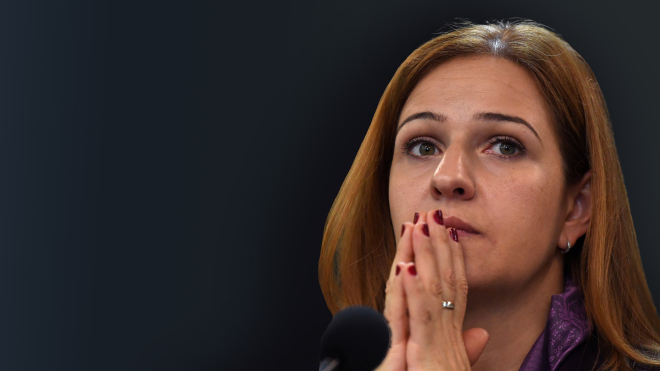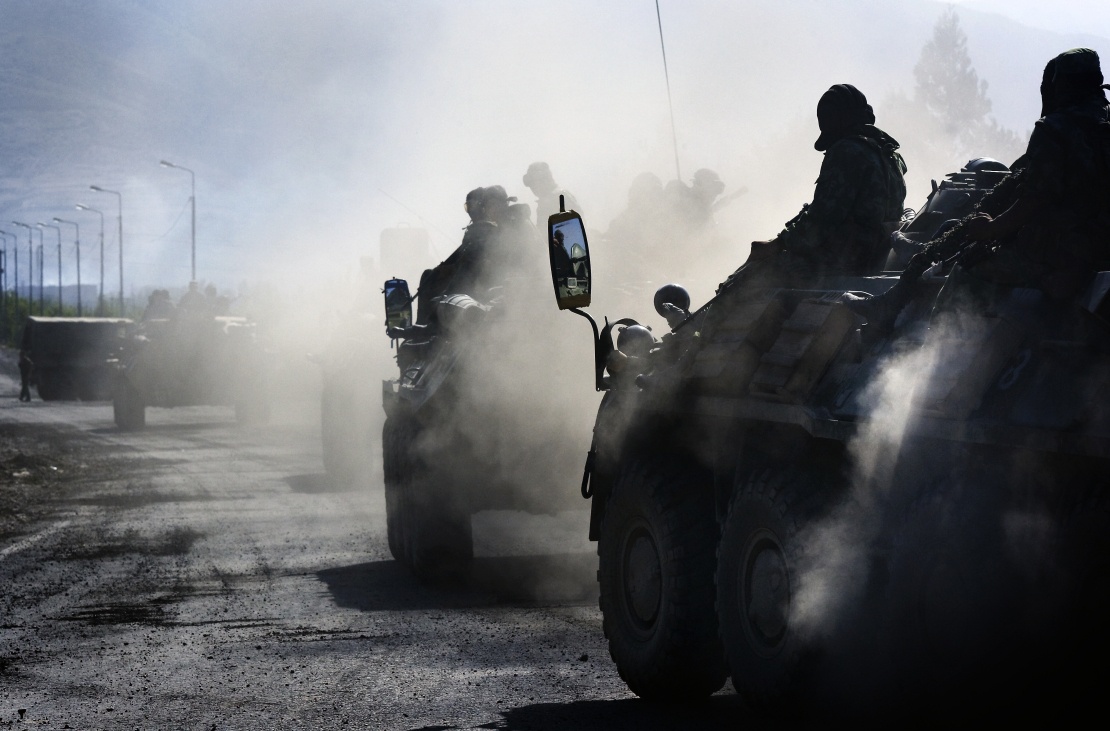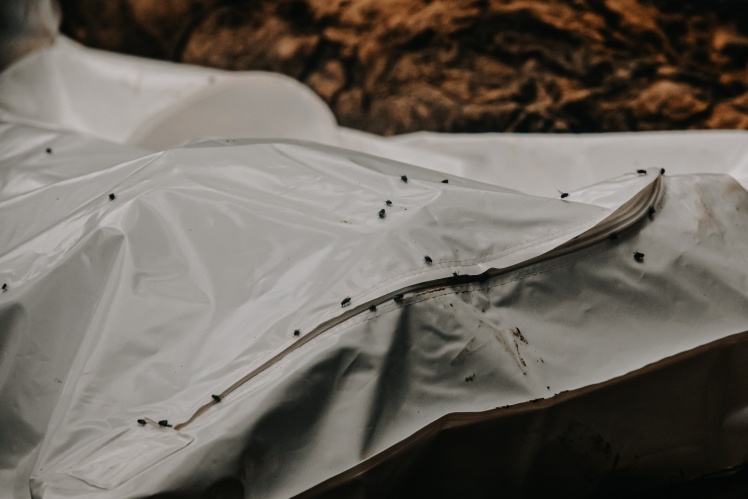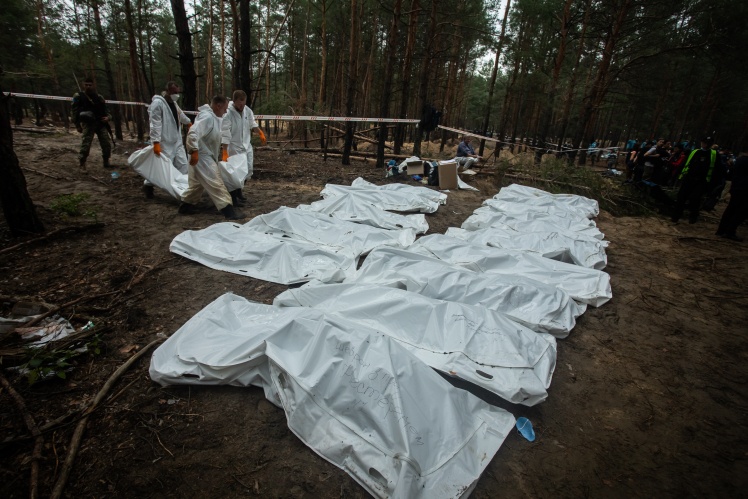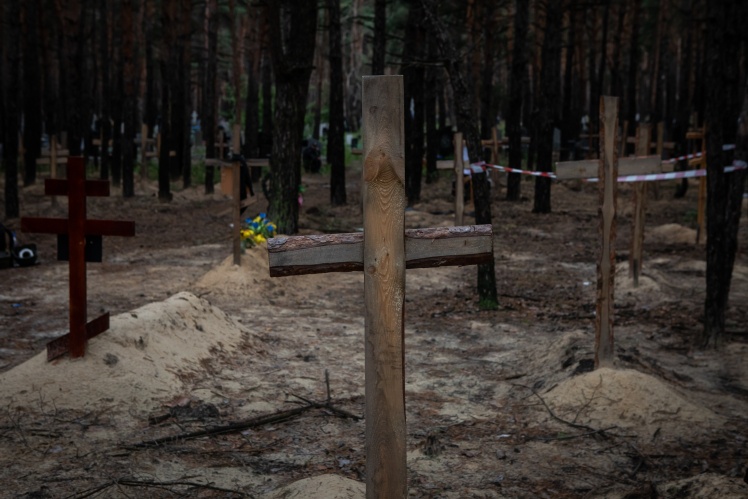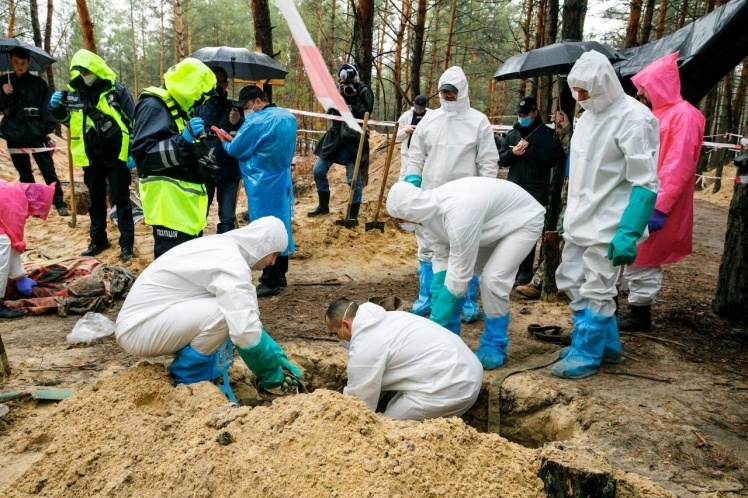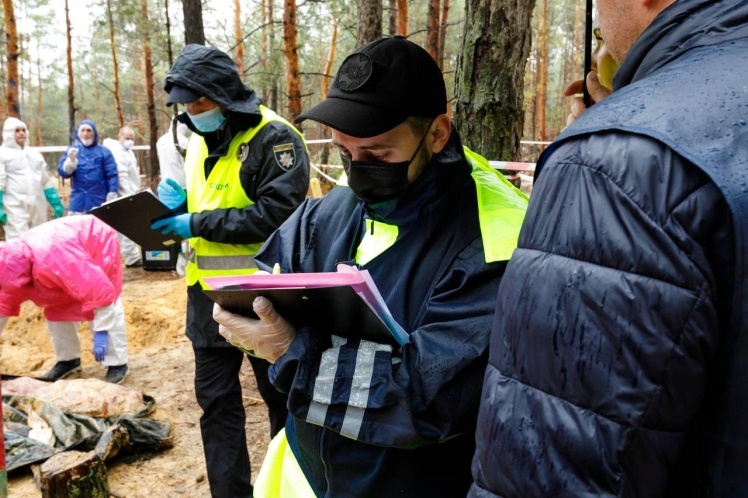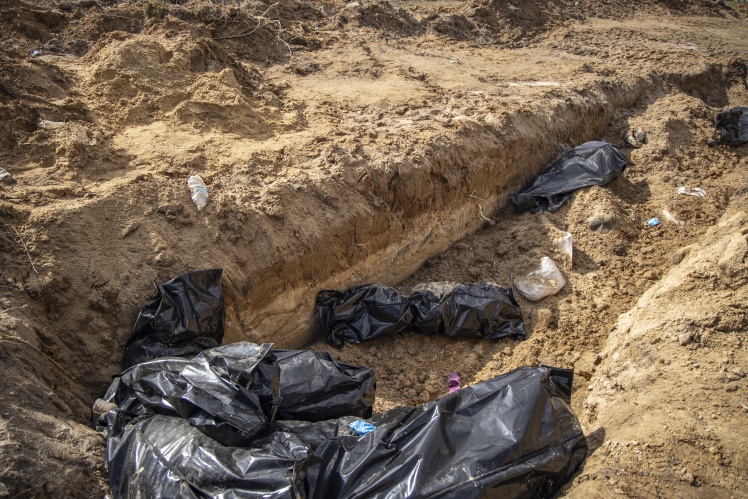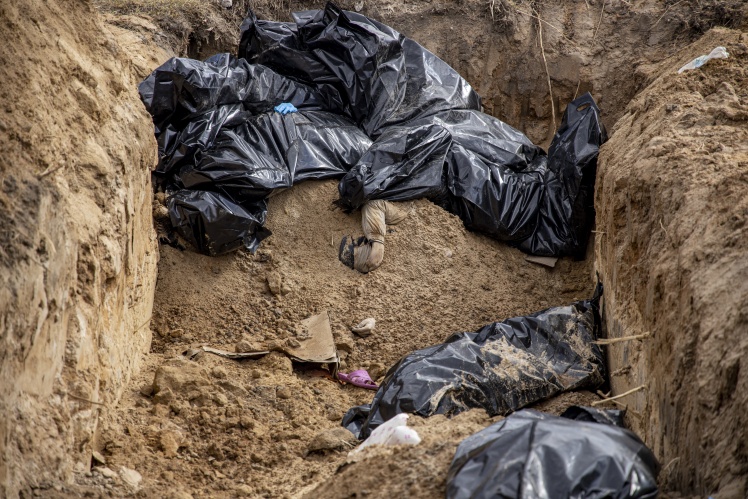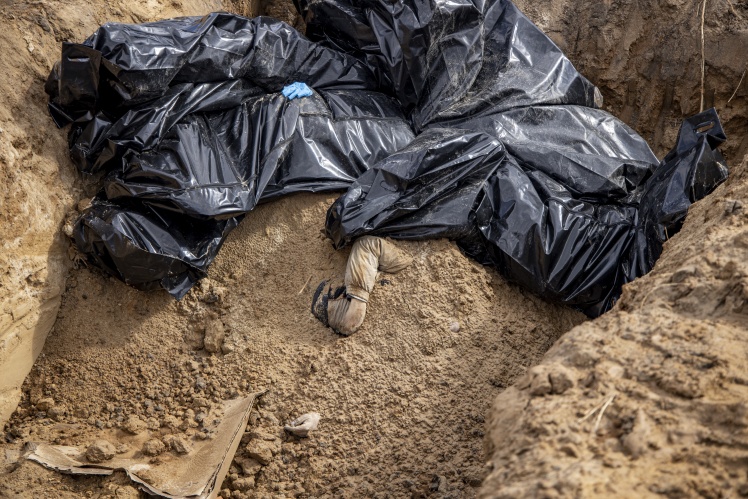Why did you decide to document the crimes of Russians in Ukraine?
On February 24, I realized that our work in Ukraine should become a priority. This is personal for me as I have been documenting Russian crimes since Chechnya, which is over 20 years. I worked in Ukraine in 2014, 2015 and 2016. I was on the Maidan [during the Revolution of Dignity], then in Donbas.
This phase of the war will change the world order. And, perhaps, will finally change the attitude of the West towards Russia. Because if there had been any reaction to the events in Chechnya, Georgia, in 2014 in Crimea, Donbas and Syria, February 24 would not have happened. Now the reaction of the West is more adequate. Not only in terms of military aid and political statements, but also in matters of punishing the guilty and trying to agree on how to bring them to justice. For the first time in 20 years, we have a real chance to punish those who commit war crimes and crimes against humanity.
Russian equipment is going to the Georgian city of Gori, which suffered the most during the war in 2008.
Getty Images / «Babel'»
And why are you sure that such an opportunity has appeared right now?
There are two reasons. The first is political will. We all want to believe that legal processes take place independently of political ones, but this is not like this. Now all international institutions have woken up: the International Criminal Court immediately opened an investigation, the UN and the OSCE are creating their commissions [to investigate crimes]. Specific countries literally opened their investigations into Ukraine in the first months based on the principle of universal jurisdiction. We are working to increase the number of these countries.
The second reason is that, unlike Syria, Yemen, Spain, and Chechnya, the Ukrainian authorities do everything to investigate crimes. We can talk a lot about how long it will take, because the Prosecutorʼs Office has more than 30,000 cases. But in the end, a whole series of decisions of Ukrainian courts will be recognized in the West.
What is the international group of lawyers, which includes the Clooney Foundation, is doing now?
It developed some legal recommendations on specific issues — for example, how to reach Russian companies established abroad, how to conduct trials in the absence of suspects. Or what to do with prisoners of war, who, on the one hand, need to be exchanged (and this is in the interests of Ukraine), and on the other hand, they are the same suspects against whom court cases are being prepared.
How does your program work, and does Amal Clooney lead specific cases regarding Ukraine?
We have decided that we will focus on cases of universal jurisdiction, that is, in the courts of specific countries. On the one hand, there is an investigation at the International Criminal Court. They will definitely bring some cases to the court — regarding five, seven or ten suspects. But these are not all crimes. There is an investigation by the Ukrainian Prosecutorʼs Office, but we donʼt work with the Prosecutorʼs Office directly.
We conducted a global survey and found that universal jurisdiction opportunities exist in 170 countries. For example, in the Czech Republic and Slovakia, neither suspects nor victims need to be tied to the country at all. The main thing is that the crime falls under the categories defined in the criminal code: these are war crimes, crimes against humanity, genocide, etc.
Perhaps when we transfer these cases to the relevant prosecutorʼs offices, in some of them Amal will represent the interests of the victims and, accordingly, lead them. Amal is an English and American lawyer, I am an American lawyer. In other countries, we work with local lawyers and can only be special representatives.
Amal Clooney.
Getty Images / «Babel'»
Is it possible to conduct cases in the USA regarding crimes committed by Russians in Ukraine? Does the principle of universal jurisdiction apply there?
In short, no, it doesnʼt work. But in the US there is a so-called extraterritorial jurisdiction, and there are also several pieces of legislation that you can work with. For example, in the US, any attack on transport hubs can be prosecuted if it affects US trade. There are American goods in Ukraine that are transported by rail. Thus, any attack on rail transport hubs can be qualified as a crime against American interests. There are also other possibilities — we are conducting a case on the death of a US citizen in the Chernihiv region. It can be pushed in America. And the USA is also interesting to us from the point of view of freezing accounts.
Currently, many human rights defenders, including foreign ones, and groups of prosecutors from different countries work in Ukraine. The Ukrainian Prosecutorʼs Office is also working. And at the same time, it is impossible for different groups to collect the same evidence. Do you coordinate your actions with others? Does the Ukrainian Prosecutorʼs Office coordinate this?
We participate in an infinite number of meetings and choose not to coordinate with all of them, because itʼs simply impossible. Therefore, a semi-formal coalition was created. It includes the Ukrainian organization Truth Hounds and several international ones. We try to work in our niche — if there are victims or families of victims, say, in Europe, they should have the opportunity to seek justice where they currently live. Even if the Ukrainian Prosecutorʼs Office conducts the same case, these people will not be included in the list of victims, because they are not physically in the country.
There are a number of cases that came to us because the victims did not have enough trust in the Ukrainian prosecutorʼs office. In particular, these are cases of sexual violence. The Ukrainian Prosecutorʼs Office has now reported that it is completely reviewing its approach to such cases.
We donʼt necessarily exclude from our files a case that someone else is engaged in. Because it doesnʼt matter who will bring this case to the end point. Letʼs imagine that we have a case about shelling, and we are conducting it in Germany. We have identified pilots and commanders. If suddenly these commanders are captured in Ukraine, the German prosecutorʼs office will transfer all its materials to Ukraine so that they can prove the charges in court there. But until that happens, the German prosecutorʼs office can issue an arrest warrant. So a person will get into the Interpol base. And if this pilot goes to rest in Turkey or Dubai, he can be detained and handed over to Ukraine. And this happened [in cases of other countries].
But there are two significant problems. The first is that the documentation of war crimes is sometimes done by people who have no idea what it is. With all due respect to journalists, when they talk about documenting war crimes, I feel a little sick as an investigative lawyer.
The second is evidence. I just arrived from the Kharkiv region, where we worked with crimes committed during the occupation. These are extrajudicial executions, torture, enforced disappearances, there are witnesses and victims. The most difficult thing is to determine the units of the Russian army that took part in this. When we come to liberated cities, the Ukrainian military often say: “Where have you been, we have already thrown out two truckloads of documents.” These are two truckloads of evidence that have been lost to the investigation. I understand the military, they need to free up space in the premises, to bring order there, so I have no complaints against them. But this is a matter of coordination between the military, who are the first to arrive at the crime scene, and the Security Service of Ukraine or the Prosecutorʼs Office. And I really hope that this coordination will be established.
Yevhenii Zavhorodnii / «Babel'»
How do you work with victims to get them to talk about crimes? Especially with victims of sexual violence. Are you preparing them for the fact that investigations and trials will take a long time and that they may have to revisit their trauma ten years later?
Almost 95% of the victims we met with do not just want to talk, but are persistently ready to seek justice, no matter how long it takes. The documents that we signed with the victims explain the whole process to them. They can get out of it at any moment if they want. We also develop methods so that people clearly understand what they are getting into. But for now, I am amazed at the willingness of people who have just experienced terrible events to seek justice. They give us strength and hope.
It is more difficult with victims of sexual violence. We involve psychologists and really care for the victims. Several children, victims and witnesses in such cases as “Serhiivka” and “Vinnytsia” are currently undergoing rehabilitation in Western countries. We start working with them not with an appeal to the authorities, but with a full assessment of their needs: medical, psychological, social.
And I hope that the investigations and trials will not last ten years, but some progress should have been made in this area.
The ten years I mentioned are the experience of the International Criminal Court.
International Court of Justice law and the process of universal jurisdiction do take years. But in this situation, we do not have a problem with access to evidence. Unlike, for example, Chechnya, when there were no mobile phones, no video recordings, no satellite photography. We have several cases where it is difficult to identify the specific soldier who committed the rape, because there is only a first name, but no last name. However, even in this situation, sooner or later we will find them.
The detention of specific criminals also depends on what will happen in Russia. Now the first defectors are already appearing — people who worked in the FSB, soldiers, officers, who are gradually fleeing to Europe. Many of them are ready to testify. I spoke with several people — for them this is a moment of remorse and a huge resentment against the Russian army.
So you already have several people testifying to you? Does it help significantly? Do you believe them?
We treat them very carefully, because in many cases we are dealing with potential war criminals. We check their words and look for confirmation with other evidence. We also perfectly understand that among them may be...
Spies?
Yes, double agents. And given our topic, we are very careful about that.
And how do you find victims? How do you search for those who witnessed or became victims of the crime you are interested in? And can Ukrainians abroad contact you?
Yes, they are already contacting us. I was recently contacted by a family from Mariupol who survived terrible crimes. Someone gave them my phone number and we will work with them.
If the Russians shelled Chernihiv with cluster bombs, then we start working on this case. It turns out very quickly that some affected family is in Italy or Germany. In addition, we started working with organizations that help immigrants from Ukraine. Organizations have our brochure about what we do, what we can do to help, which witnesses and victims we are looking for.
When we already know that a case will reach the prosecutorʼs office, we say: “If you were a witness or a victim, or know someone who was a witness or a victim in a specific episode, on a specific day, in a specific place, contact us.” Very often it is almost word of mouth.
And how do you determine which cases to take?
We have certain categories in which we work, and then there is the issue of communication with local Ukrainian human rights defenders, very often with journalists. So we say: “We are going to Izyum. If you have cases that you think we can bring [to court], say so.” Or if there are cases and it is known that family members or victims are in Europe.
Telegram / Олег Синєгубов
Aside from working with people, what other tools do you use when gathering evidence?
We work with a company that specializes in what is called OSINT [Open Source Intelligence] — research based on open sources of information. The people we work with are some of the best professionals. They are very active in helping the Ukrainian prosecutorʼs office and the SSU.
We receive information from satellites — the kind that can be bought, then our analysts work with it. If we investigate a bridge being blown up during the evacuation of civilians, we take pictures and see if the Ukrainian military was on it. This is necessary to determine whether this shelling was legal from the point of view of the rules of war. We use the eyeWitness application, social networks. A lot of information about specific units, commanders, soldiers can be found in Telegram or VKontakte. In Telegram, we had to create our own program for searching.
How many people are there in total in your team?
Docket, the program I manage, has 14 people. There are local lawyers in the countries where we do business. Some of them work pro bono, some of them we hire to conduct specific cases.
You said that if there were Ukrainian military personnel on the bridge through which the evacuation took place, then it is more difficult to interpret it as an attack on civilians. Is there a rule as to how far the military should be from a civilian object? Because several cases fell apart in the tribunal for the former Yugoslavia, because there were police stations next to the damaged civilian objects.
This is a really difficult situation. There were very few such cases in international courts, because they are complex. There have been examples in history when the army simply destroys civilian objects, and perhaps we will prove that this was also the case in Mariupol. But many other crimes are not so obvious. In some cases, there was actually a military target close to the civilian object that was hit as a result. The most important principle of international humanitarian law is the principle of distinction and proportionality. Even if the military is nearby, the question arises: what analysis did the Russian artillery or air force conduct before carrying out this attack; how they chose missiles; how accurate are these missiles; what is the value of this military objective compared to the potential damage to the civilian population?
Getty Images / «Babel'»
Therefore, we try to take cases that are obvious, and even with them, everything is not easy. If we talk about, for example, the conditional school in which the Ukrainian military was stationed, then only from the point of view of humanitarian law, I emphasize, this object becomes legitimate for the Russian attack. That is, in each specific case, it is necessary to understand in detail.
What else do you cover besides shelling of residential quarters? Abduction of children, genocide?
So far, we are dealing with cases of sexual violence, torture, extrajudicial executions, and enforced disappearances. A separate category of our cases are cases about Russian propagandists.
And how do you qualify the actions of Russian propagandists? In international tribunals, the actions of propagandists from various countries were classified as genocide or calls for genocide, or crimes against humanity. But crimes against humanity are not yet designed in Ukrainian legislation. There is war propaganda, although this is not how crimes are classified. There is also a crime against territorial integrity.
We have just completed our legal analysis. There are several options. The first is the crime of “incitement to genocide”. There were such cases, but there are very few precedents — the fingers of one hand will be enough. Especially if we talk about successful ones. To prove this crime, it is not necessary to prove the existence of genocide. This is very convenient, because so far we are only trying to answer the question of whether genocide is currently taking place in Ukraine. I think the International Criminal Court should open a genocide case. What conclusions they will reach is the next question.
The second point is persecution ― “persecution of the civilian population”. This is difficult to prove. The third option is complicity in other war crimes. It can have various forms, in particular, appeals. But it is necessary to prove that they are related to a specific war crime.
Thatʼs why, Iʼll be honest, weʼre still trying to follow the simplest path and consider the crime of war propaganda in its various guises. Itʼs practically absent in the criminal codes of Western countries. But it has remained in the codes of Eastern European countries since Soviet times. Letʼs see how it will be possible. The evidentiary threshold for such a crime is much lower than for all the others we have mentioned. Therefore, I hope that something can be done in this direction.
Mass burials in Bucha.
Stas Kozlyuk / «Babel'»
And who are your suspects?
I canʼt specifically name the suspects yet, itʼs too early. But I can divide them into categories. We look at direct performers. These are people who raped or pulled the trigger, also airplane pilots, submarine commanders. The next level of command is those who gave the order, such as the squadron commander. Then everything depends on the specifics of the case. When it comes to launching missiles from submarines, it is clear that such decisions are not made by the commander of the submarine, but by someone at a much higher level. The same applies to the plane. But when it comes to torture or execution, it can be an excess of the executor.
But you donʼt reach the level of higher command?
I believe that this is not our task. Because we work with national prosecutors, they will not be able to overcome diplomatic immunity. Therefore, I easily leave it to the International Criminal Court or the Special Tribunal that will be created. We can include the Secretary of Defense or the President in our affairs, but practically this wonʼt make any sense.
Have you submitted any evidence to the International Criminal Court? If yes, what were those cases?
The International Criminal Court knows about our work in Ukraine, as we work with it in other cases. So far, they are cautious about the information collected by NGOs. It seems to me that they believe they have enough resources to conduct the investigation independently and interact with the Ukrainian prosecutorʼs office and the prosecutorʼs offices of other states. Itʼs their right. But if they ask, we have something to give them.
In addition, they may have a skeptical attitude, because there are too many different organizations working in Ukraine, and sometimes they donʼt follow the rules for collecting and storing evidence. There are very few organizations that specialize in collecting evidence that will be accepted by the court. A special system of analysis and storage of materials is needed, a special database that stores chains of evidence (chain of custody) is needed. If they are not there, if when collecting evidence a person simply picked up a piece of paper and put it in a backpack, if an elementary form is not filled out, it cannot be evidence. If you took a statement from a person, and there is no consent form for giving evidence, this statement cannot be used in a criminal case.
We never take detailed statements from witnesses and victims. And there are a large number of organizations, especially journalists, who take detailed interviews — their work is like this, I understand. But this person will stand in court in five years and will never repeat what he or she said five years ago. And there have already been precedents in courts when interviews were used to discredit witnesses. Itʼs not always about significant discrepancies. There may be a question: “What dress did you wear?”. And if the woman said in the interview that she was wearing red, and speaking in court she said that she was wearing green, the defense lawyer says that such a witness cannot be believed. This is how things fall apart.
In July, you said that you were going to submit specific cases to the prosecutorʼs office. Did you manage to do it?
Not yet, but weʼre close. Literally next month, we will have meetings with prosecutors, I wonʼt say of which countries yet. I really hope that by the end of the year we will be able to file these cases.
Some cases turned out to be much more complicated than we thought. These are, for example, large-scale shelling, because cases of executions and torture are much simpler. In the case of shelling, it is necessary to determine to what extent this shelling was illegal, what weapons were used, what orders were given, etc.
Getty Images / «Babel'»
Your strategic partner, The Sentry, is investigating the activities of Wagner private military company. And on your website it says that they are mercenaries. Can those who fight in Ukraine be considered mercenaries? Are they still combatants, because the state sends them to war?
We are not dealing with Wagner in particular, but only with whether its members are involved in certain crimes. I believe that in this particular situation, the “Wagnerians” cannot be considered mercenaries. The way Wagner works in Ukraine is very different from the way they worked in Syria or Africa. All the statements of the defectors from Wagner indicate that they were completely under the leadership of the Russian Ministry of Defense. If I understand correctly, they are vanguard units of the Russian army, and not just integrated into it.
That is, they are combatants, which means that the requirements of all international conventions apply to them. And if they violate them, they are war criminals, right?
Yes, definitely.
Are you specifically investigating the activities of the “Wagnerians”?
No, the “Wagnerians” were mostly involved in vanguard operations in the east, which are not the areas we are dealing with now. There are active hostilities, which greatly complicates access.
Can Russiaʼs deeds in Ukraine be called genocide? Putin says that Ukraine is not a state, propagandists call to kill Ukrainians, Russians take our children away.
I would say that there are more and more factors and evidence that at some point it [Russiaʼs actions] qualify as genocide. So far, I cannot make such an unequivocal conclusion, because it requires a colossal investigation. For genocide, it is extremely important to prove intent. Practice shows that it is very difficult.
You documented the crimes of the Russian military in Chechnya, then in Syria. Has anyone been prosecuted there?
Yes, in Syria. These are isolated cases, but each such case is symbolic and gives hope. Very recently in Germany there were two trials of quite high-ranking people who were found guilty of crimes against humanity, involved in torture, executions, and so on. Currently, warrants have been issued for the arrest of a much higher status of Syrian officials, also by German and French courts. But the process is slow.
And when may the first verdicts appear in Ukraine, based on the investigations you are conducting?
It is difficult to say about the verdicts. They will be when the people are in court. Iʼm more interested in when we can get arrest warrants. Our task is to prepare as complete a dossier as possible, and then everything will depend on the political will, busyness, determination and pedantry of each of the national prosecutorʼs offices. I really hope they understand that this has to happen as soon as possible, that we canʼt wait years.
I remember very well how I worked in Chechnya, and suddenly everyone started talking about The Hague. There was never a chance to bring Chechnya to the International Criminal Court, but it was such a “Damocles sword” that suddenly appeared over them. I vividly remember the effect of the Yugoslavia tribunal, when it suddenly became clear that those who thought they would escape responsibility could end up behind bars. There will be no impunity, and if they are willing to live with an open international arrest warrant for the rest of their lives, fine. And if not, maybe theyʼll think twice.
Getty Images / «Babel'»
How realistic do you think the Special Tribunal is for Putinʼs aggression?
Thatʼs a good question. We donoʼt have an official position, so I will share my opinion. At first I was a little skeptical about this idea, because it would duplicate the process that is going on at the International Criminal Court. But the ICC does not deal with the crime of aggression. Apparently, the Special Tribunal is correct, because such a tribunal has not yet existed. And it is important for us to call a spade a spade.
Lawyers will condemn me now, but if we admit that Russia committed aggression, then we admit the violation of the right to life of both civilians and military personnel. This changes the pattern we have all been used to working with for decades. There is an international conflict, there is international humanitarian law, two sides of the conflict — and we were all very comfortable in this scheme. Sooner or later, some new understanding of the world order will have to be built. Therefore, it is very important to legally condemn the very fact of aggressive war. The question is how much this tribunal will be supported by the international community. I am sure that there are a number of countries that will not support it.
Because of ther own similar actions.
Yes. And the tribunal is a question of money. Historically, such tribunals have been extremely expensive. The tribunal needs the blessing of the UN General Assembly or some other organization, so that it could overcome diplomatic immunity. That is why the Special Tribunal can really be useful — if it exists.
Translated from Ukrainian by Anton Semyzhenko.
The world is changing right now. Together with Babel, you can also change it. Please support us: via Patreon 🔸 [email protected]🔸donate in cryptocurrency🔸in Ukrainian hryvnia.
